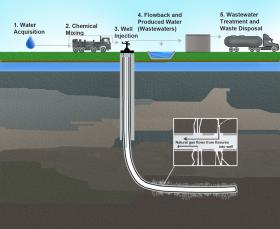An Evaluation of Fracture Growth and Gas/Fluid Migration as Horizontal Marcellus Shale Gas Wells are Hydraulically Fractured in Greene County, Pennsylvania
A long (80 page) study has just been released by the U.S. Department of Energy.
The study is titled: “An Evaluation of Fracture Growth and Gas/Fluid Migration as Horizontal Marcellus Shale Gas Wells are Hydraulically Fractured in Greene County, Pennsylvania”
The below is excerpted from the OVERALL CONCLUSIONS of this long and detailed technical study:
“A comparison of production and pressure records from Upper Devonian/Lower Mississippian wells collected weekly for 1 year after hydraulic fracturing with
records collected for a 3-year period before hydraulic fracturing did not reveal pressure or production increases that might indicate migration of gas from the over-pressured Marcellus Shale below. Isotopic analysis of gas and produced water from the Upper Devonian/Lower Mississippian wells did not detect the presence of gas or fluids from the Marcellus Shale. These lines of evidence indicate that there has been no detectable migration of gas and fluids from the Marcellus Shale to the overlying Upper Devonian/Lower Mississippian gas field such as could beprovided by open fractures or unplugged wells. “
If you are prepared to read through the report, you will learn that hydraulic fracture growth (fracing) ceased more than 5,000 feet below drinking water aquifers and that there was no detectable upward (or downward) migration of gas or fluids from the hydraulically-fractured Marcellus Shale.
To summarize the study …. Move along, there is nothing to see here! What happens in the Marcellus (essentially) stays in the Marcellus.
Here is the link to the entire report:
Anti-fracers …. Read it and weep!
JS
Tags:
Replies to This Discussion
-
 Permalink Reply by David Perotto on September 16, 2014 at 9:33am
Permalink Reply by David Perotto on September 16, 2014 at 9:33am -
Their talking points always get debunked. Once this happens, they will re-invent new ones. Dishonesty reveals itself, given enough time.
-
 Permalink Reply by Joseph-Ohio on September 16, 2014 at 11:01am
Permalink Reply by Joseph-Ohio on September 16, 2014 at 11:01am -
Thanks for the reference Jack.
Pedal to the metal.
-
 Permalink Reply by Nancy Mosley on September 16, 2014 at 2:48pm
Permalink Reply by Nancy Mosley on September 16, 2014 at 2:48pm -
http://wunc.org/post/duke-university-study-blames-faulty-wells-not-...
 A Duke study shows that faulty gas wells, not fracking itself, were responsible for water contamination at several sites in Pennsylvania and Texas.Credit Environmental Protection Agency
A Duke study shows that faulty gas wells, not fracking itself, were responsible for water contamination at several sites in Pennsylvania and Texas.Credit Environmental Protection Agency
A Duke University study exonerates hydraulic fracturing from contaminating drinking water at sites in Pennsylvania and Texas. Instead, researchers blame faulty shale gas wells for leaking methane into the water, sometimes making it flammable.
The study was published in the Proceedings of the National Academy of S... this week. It's the latest article in ongoing research on the implications of fracking for natural gas. New data and isotopic evidence confirms that leaking wells are directing methane into the drinking water.
Duke University environmental sciences professor Robert Jackson is a co-author of the study. He said the study is significant because it confirms that some drinking water wells were indeed contaminated by the gas wells, but also because researchers could trace the contamination to cracks and leaks.
Jackson said the energy industry has always been careful to speak about the safety of fracking, which is, specifically, the process of breaking rock to release gas. They don't say as much about related processes, like drilling. But most people don't make that distinction.
“For people whose water has been contaminated, they don't care what step in the process has caused it,” Jackson said. “All they know is that they can't use their water.”
Jackson says companies should be more concerned with maintaining pipes and cement foundations in the top 500 feet of the surface, and worry less about what happens thousands of feet below.
But Duke water quality and geochemistry professor, and co-author, Avner... said this means companies can repair their wells and stop the leaks.
He also said North Carolina should take note, as it begins to allow companies to explore for natural gas.
“We can do some prevention, some cautious measure to prevent possible contamination,” said Vengosh. “For example, building a safety zone between the shale gas sites and the drinking water well.”
Vengosh says this doesn't mean there are no other environmental implications for fracking: Drilling and wastewater management at the sites present their own risks.
Top Content
Latest Activity
- Top News
- ·
- Everything
© 2025 Created by Keith Mauck (Site Publisher).
Powered by
![]()
| h2 | h2 | h2 |
|---|---|---|
AboutWhat makes this site so great? Well, I think it's the fact that, quite frankly, we all have a lot at stake in this thing they call shale. But beyond that, this site is made up of individuals who have worked hard for that little yard we call home. Or, that farm on which blood, sweat and tears have fallen. [ Read More ] |
Links |
Copyright © 2017 GoMarcellusShale.com